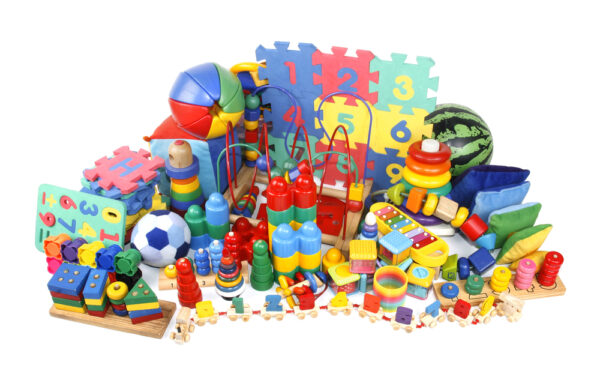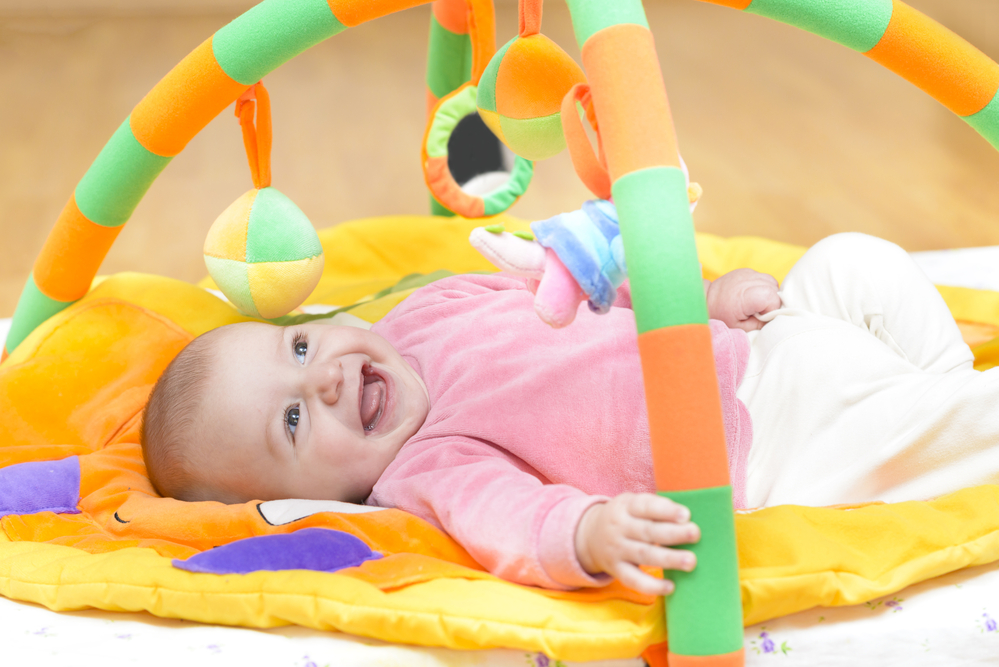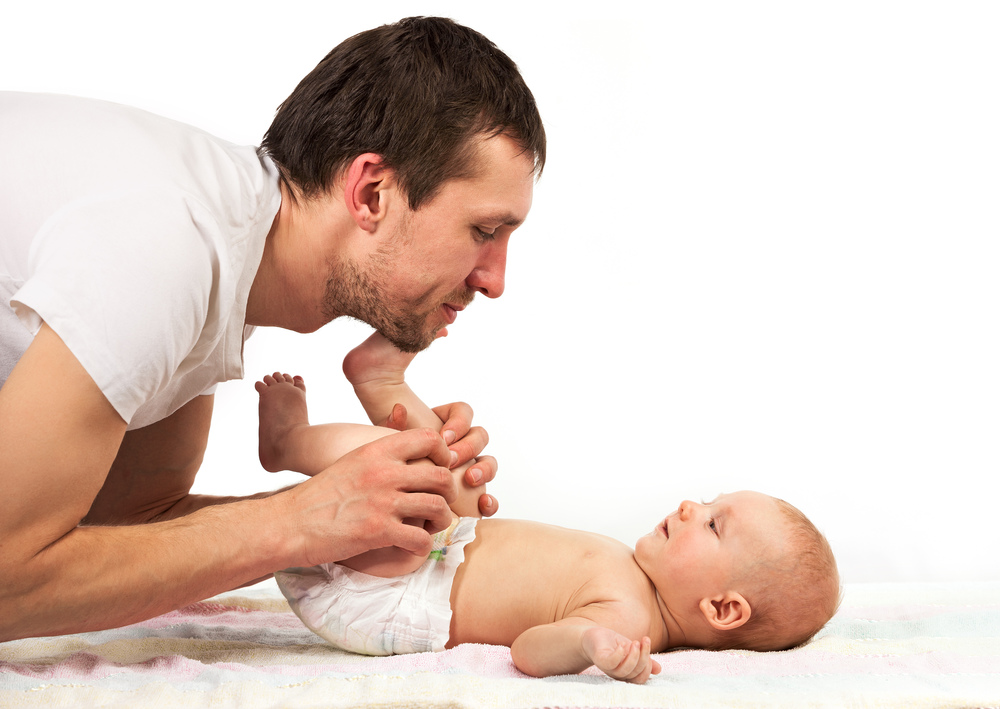Parents often ask me how they can ‘play’ with their newborn baby. Newborn babies do spend a lot of their time feeding and sleeping but it is important to spend some time playing with them as all babies learn through play. There is no need for any formal sort of play activity to teach your baby, it can be relaxed and fun, no pressure.
Play:
Play for a young baby may just be talking to them while you change their nappy or sitting next to them on the floor while they have a kick around. You are their favourite toy and if you’re smiling and talking happily, they will love that even more.
Communication:
In the early days and weeks, communication can be a form of early play. Newborn babies already have the ability to hold a gaze with you for short periods of time and will sometimes copy your facial expressions, including poking out their tongue if you do. Over the first few weeks their communication will move into verbal cooing where your baby will hold good eye contact with you and when they stop, they will leave a pause for you to talk back and then they will often coo or ‘talk’ back at you again. This is a conversation, and most parents will play along instinctively, this tells your baby that you are interested in what they are trying to tell you and their feelings and that you love them. At first these interactions will only last for short periods but over time this will grow, and the conversations will become longer with many back and forth conversations. By 8 weeks old many babies are gurgling, cooing, and giggling at times, parents love this.
Singing:
Babies love hearing your voice singing, even if you don’t think you have a good voice, your baby will love it. You can sing anything you like and if you’ve forgotten the words to nursery rhymes, try watching a children’s TV show to remind yourself, the words will most likely come flooding back. You can try rocking your baby to the beat and using actions to make it more fun.
Smiling:
By 6 weeks of age most babies have started smiling, in the beginning you may only notice them when they are sleeping or content but by 6 weeks most will smile while looking into your eyes in response to your smile. Most babies will do this when you are smiling at them and talking in a high-pitched voice, being more animated than usual helps as well. This is a very special moment when parents often feel like all the hard work you have been doing is appreciated, and you are getting something back for all your efforts.
Getting Outdoors:
Take your baby outside, let them see and hear what is going on, trees, gardens, cars driving. A walk in the pram is a chance to see new things and to learn. Nature is important for all of us to be part of sometimes and the fresh air is good for us all.
Reading:
Babies enjoy books, it is never too early to start reading to your baby. They will enjoy this quiet time with you, adding this into the bedtime routine can work well. Sit your baby on your lap with the book towards them, you don’t have to read all of the words, you can point to pictures and tell them about what you can see or point to animals and make their noises. We want your baby to think books are fun and a nice time to spend together. Board, fabric, or bath books are a great option for young babies as they can’t damage them as easily and they usually don’t have too much text on each page.

Tummy Time:
Tummy time is one of the most beneficial activities you can do with your baby. In the early days this might just be on your chest and they will want to lift their head up and look at you which is great practice.
Do start to put a wrap or playmat down on the floor and give your baby a chance to do some tummy time independently. It’s safest to do this on the floor as one day your baby will roll, and this can happen from an early age. Put some toys around them to look at and play mirrors work well too, babies love to look at themselves. Get down on the floor and lie next to your baby, talk to them, and make it fun.
If your baby falls asleep on their tummy, it’s important to place them on their back when unsupervised in their cot as tummy sleeping is a SIDS (Sudden Infant Death Syndrome) risk.
It’s important to start tummy time early in your baby’s life as their head grows very quickly and becomes heavy, the longer you wait it becomes more difficult to lift and then he may dislike tummy time.
By 8 weeks of age most babies should be able to lift their head and hold their chin up off the mat, this only occurs with practice so keep giving him plenty of tummy time to gain this skill.
If your baby dislikes tummy time you can try other positions that will help those same muscles to strengthen such as lying them on your lap on their tummy when sitting, carrying them on their tummy across your arm, bathing across your arm in the bath, massaging their back so they will tolerate some tummy time.

Toys:
Young babies don’t need a huge amount of toys but they can enhance play, giving parents fun items that they can use to interact with their baby. Much of the learning comes from the interaction with you, not the toy itself. And don’t believe some of the claims on the packaging, no toy can make your child become a genius!
At the beginning babies can’t play with the toys themselves, you can show them that when you shake a rattle it makes a rattle sound, as they get older you can put it in your baby’s hand and one day, they will shake it themselves.
Always check toys are suitable from 0-3 years as they are covered by safety standards and will be safe for your baby and not have small pieces that could be swallowed or choking hazards.
Some toy suggestions:
- Books with high contrast black and white and some pops of colour.
- Light weight rattles, some can velcro onto their wrist or ankle.
- Play gym with colourful hanging toys to look at and reach for and hit.
- Play mat with colours/ textures, some have mirrors and different textures, crinkle fabrics sections.
- Socks with bells in them.
- Light weight teddy bears/dolls.
- Soft colourful, crinkle activity type toys.
- Hanging toys that clip onto pram or above car seat.
- Colourful soft blocks.
- Linked chains.
- Mobiles to look at above change area or cot although these can be stimulating when trying to sleep.
- Mirrors, unbreakable to put on floor and encourage tummy time.
- And many more.
Try to avoid too many electronic toys even though they will enjoy them as we want to encourage your baby to make their own noises for animals, cars etc.
Screen time:
The evidence tells us that screen time is not only of no benefit to under 2 year olds but could also be dangerous as it stimulates and confuses babies brains and stops them from playing and learning. The only exception to this is video calls with family and friends which encouraged interaction and has the benefit of bonding and getting to know their family.
Try not to compare your baby with other babies, the most important part of play and development is that there is gradual progress. If your baby does not seem to be progressing like other babies of a similar age, it is important to discuss this with your child health nurse, GP or paediatrician. We know parent’s concerns are important as you are your own baby’s expert.
Enjoy playing with your baby!
To view on YouTube:









